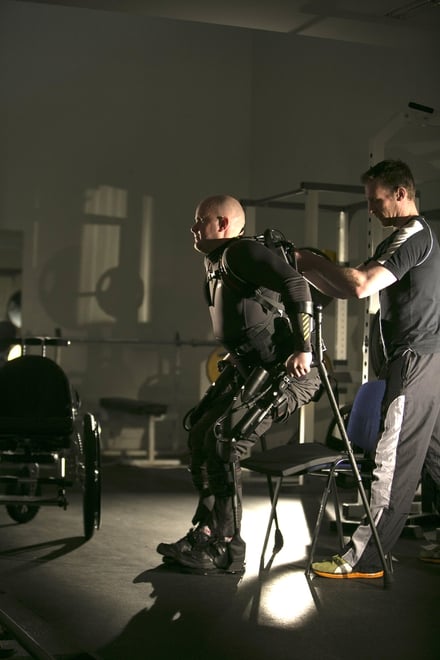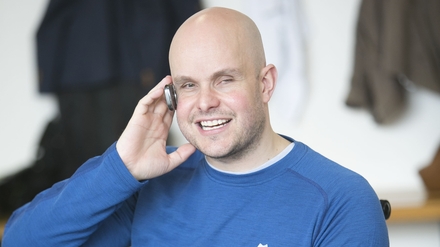With acclaimed documentary Unbreakable: The Mark Pollock Story airing on RTÉ One on Monday December 22 at 9:35pm, director Ross Whitaker tells Harry Guerin about the film, which follows the blind adventure athlete as he rebuilds his life after paralysis.
Harry Guerin: What do you remember about the first time you met Mark Pollock?
Ross Whitaker: We were in Trinity College at the same time. Mark started one year behind me and neither of us were big lovers of studying, preferring to perch on the wall of the Arts Block and watch the world go by. Strangely, that's where we actually became friends. Mark could see and walk at that stage and he was an extremely friendly person who got along with everyone and was good fun. So we were friendly from that stage.
You had worked with Mark before on the South Pole documentary Blind Man Walking. Who contacted who about making Unbreakable?
Mark had fallen from a window and broken his back, fractured his skull and had all sorts of internal injuries; his life was in the balance, so the first thought was never, 'This would make a great subject for a documentary'. People started asking me would I continue filming but my immediate reaction was, 'No'. One, my first concern was Mark's welfare and two, maybe in the back of my mind, I felt that I had told much of Mark's story. As time went on, though, it seemed there was a general level of support out there for exploring it - a couple of funders mentioned it - and I decided to let Mark decide. He was quite keen on the idea - I think it gave him a small bit of focus near the beginning of his recuperation. And we set off with the agreement - also with Simone [George], his fiancée - that we would film but with no set ending and that we would stop if we felt it wasn't appropriate.
Did you have any misgivings at all before you started making the film?
Yes, I really did. My primary concern was Mark's health, and I knew it would be a painful process for him to recover and I didn't know if that should be documented. I wanted him to be able to approach this tough part of his life in a private way. That was combined with me questioning whether I was the right person to tell this story or if this story would work as a documentary. I knew that the film would need to be quiet, intimate, stationary at times and I wasn't sure if that was my style, really. But, in the end, we both just went with it.

And were there times when you were filming that you thought, 'I shouldn't be here'?
Not really. Once we were all on board, I think it's important to show that truth, and to show both the light and shade of life. Life is never entirely happy or sad, and I think the audience need to see the dark times to allow them to emotionally contextualise the triumphs. The only scene I feel bad about is when Simone must fill up her car with all of the paraphernalia that comes with paralysis - the chairs and all of the other gear - and I felt terrible for not helping her because it was difficult for her to do it on her own. I think the scene is important because it shows, without comment or interview, the difficulties she was facing.
Was the process very emotionally draining for you, or did you develop a strategy for remaining somewhat detached?
During filming it was fine because what I would film was only a small portion of the time that I was with them. There were a lot of conversations and laughs off camera when we were just hanging out, and on a personal level we enjoy each other's company, thankfully. But in the edit I found it tough to see the scenes cut so very well by my editor, Andrew Hearne, and I must admit to breaking down on more than one occasion in the edit. Ultimately, though, the film has a triumphant ending, so it's important to show the scenes that are more emotional too.
Watching the film, people will say to themselves, 'Look at the nonsense I'm worrying about and what this guy is going through'. Did the same thing happen to you making it?
Yes. I think about that every day, pretty much. And it has been something audiences have been saying to me at every screening. I don't really like stratifying problems because everyone thinks their problems are important and they are, to them. But, Mark really has been through more than any human should have to endure - and he is not the only one - and it does put things in perspective.
How has Mark been getting on these past few months?
Great, really. I think his health has been good and that's a springboard for him to be able to do the things he wants to. He is making progress in his quest to bring cutting edge spinal injury research to Ireland - something that both him and Simone work very hard on - and with the help of the Mark Pollock Trust, the Run in the Dark and hopefully this film too, he's really on the cusp of doing something exceptional.

What have you learned from him and Simone?
In short, anything is possible if you go for it. It's hard for people to understand but they are world leaders in what they're trying to do. After Christopher Reeve died there was a void in patient advocacy and Mark, and some other like-minded people, are trying to get paralysis back on the agenda. I think they're going to be successful.
Have they made you think about your own career in a different way?
Not really, but the only weird thing is that having spent so long on this story, I'll soon be moving on to other stories. That's the life of a documentary-maker. And having been so involved in this one, I'm not sure how that's going to be.
Read our review of Unbreakable: The Mark Pollock Story here.

